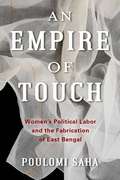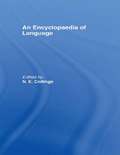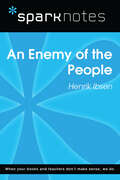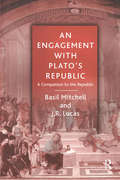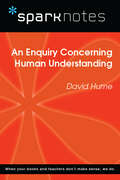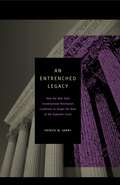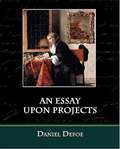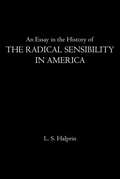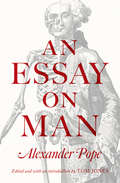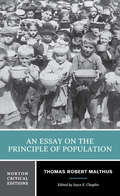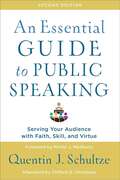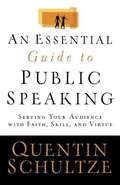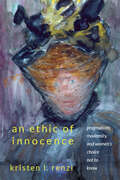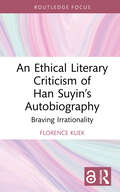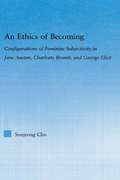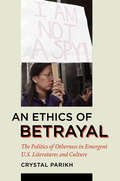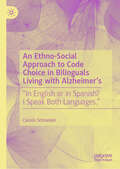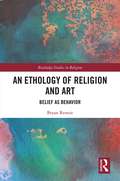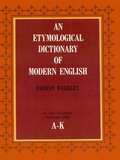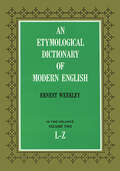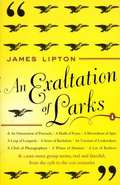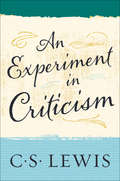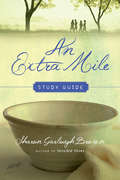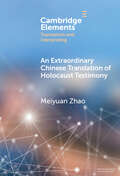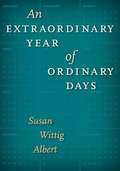- Table View
- List View
An Empire of Touch: Women's Political Labor and the Fabrication of East Bengal (Gender and Culture Series)
by Poulomi SahaIn today’s world of unequal globalization, Bangladesh has drawn international attention for the spate of factory disasters that have taken the lives of numerous garment workers, mostly young women. The contemporary garment industry—and the labor organizing pushing back—draws on a long history of gendered labor division and exploitation in East Bengal, the historical antecedent of Bangladesh. Yet despite the centrality of women’s labor to anticolonial protest and postcolonial state-building, historiography has struggled with what appears to be its absence from the archive.Poulomi Saha offers an innovative account of women’s political labor in East Bengal over more than a century, one that suggests new ways to think about textiles and the gendered labors of their making. An Empire of Touch argues that women have articulated—in writing, in political action, in stitching—their own desires in their own terms. They produce narratives beyond women’s empowerment and independence as global and national projects; they refuse critical pronouncements of their own subjugation. Saha follows the historical traces of how women have claimed their own labor, contending that their political commitments are captured in the material objects of their manufacture. Her analysis of the production of historical memory through and by the bodies of women spans British colonialism and American empire, anticolonial nationalism to neoliberal globalization, depicting East Bengal between development economics and postcolonial studies. Through a material account of text and textile, An Empire of Touch crafts a new narrative of gendered political labor under empire.
An Encyclopedia of Language
by N. E. Collinge* Examines how language works, accounting for its nature, its use, its study and its history* Two comprehensive indexes of Topics and Technical Terms, and Names* Carefully illustrated to explain key points in the text`This rich repository of information on all aspects of language is a must for all libraries in higher education, schools and larger public libraries.' - Library Review`Each article has an excellent bibliography. In addition, there are comprehensive indexes of topics and technical terms and names. Highly recommended for all college and general public libraries.' - Choice`This important book is in many ways a state-of-the -art survey of current conceptions of, and approaches to, language, with generous references to more detailed sources. Each chapter has a good bibliography.' - Language International`A comprehensive guide ... with very thorough bibliographies ... Collinge's Encyclopedia is recommended to academic libraries.' - Reference Reviews`The bibliographies are an invaluable aid ... the editor is to be congratulated for having done an excellent job ... there are virtually no areas of language and linguistics that do not get a look in somewhere, and there is good signposting in the text itself.' - Nigel Vincent, Times Higher Education Supplement
An Enemy of the People (SparkNotes Literature Guide Series)
by SparkNotesAn Enemy of the People (SparkNotes Literature Guide) by Henrik Ibsen Making the reading experience fun! Created by Harvard students for students everywhere, SparkNotes is a new breed of study guide: smarter, better, faster.Geared to what today's students need to know, SparkNotes provides:chapter-by-chapter analysis explanations of key themes, motifs, and symbols a review quiz and essay topics Lively and accessible, these guides are perfect for late-night studying and writing papers.
An Engagement with Plato's Republic: A Companion to the Republic
by Basil Mitchell J.R. LucasOutrageous, unfashionable, politically incorrect though many of Plato's opinions undoubtedly are, we should not just dismiss them as thoughts now unthinkable, but think through them, recognising the force of the arguments that led Plato to enunciate them and consider the counter-arguments he might have marshalled to meet contemporary objections. This book encourages today's students to engage in Plato's thought, grapple with Plato's arguments, and explore the relevance of his arguments in contemporary terms. A text only comes alive if we make it our own; Plato's great work The Republic, often reads as though it were addressing the problems of the day rather than those of ancient Athens. Treating The Republic as a whole and offering a comprehensive introduction to Plato's arguments, Mitchell and Lucas draw students into an exploration of the relevance of Plato's thought to our present ideas about politics, society and education, as well as the philosophy of mathematics, science and religion. The authors bring The Republic to life. The first chapters help the reader to make sense of the text, either in translation or the original Greek. Later chapters deal with the themes that Plato raises, treating Plato as a contemporary. Plato is inexhaustible: he speaks to many different people of different generations and from different backgrounds. The Republic is not just an ancient text: it never ceases to be relevant to contemporary concerns, and it demands fresh discussion in every age.
An Enquiry Concerning Human Understanding (SparkNotes Philosophy Guide)
by SparkNotesAn Enquiry Concerning Human Understanding (SparkNotes Philosophy Guide) Making the reading experience fun! SparkNotes Philosophy Guides are one-stop guides to the great works of philosophy–masterpieces that stand at the foundations of Western thought. Inside each Philosophy Guide you&’ll find insightful overviews of great philosophical works of the Western world.
An Entrenched Legacy: How the New Deal Constitutional Revolution Continues to Shape the Role of the Supreme Court
by Patrick M. GarryAn Entrenched Legacy takes a fresh look at the role of the Supreme Court in our modern constitutional system. Although criticisms of judicial power today often attribute its rise to the activism of justices seeking to advance particular political ideologies, Patrick Garry argues instead that the Supreme Court’s power has grown mainly because of certain constitutional decisions during the New Deal era that initially seemed to portend a lessening of the Court’s power. When the Court retreated from enforcing separation of powers and federalism as the twin structural protections for individual liberty in the face of FDR’s New Deal agenda, it was inevitably drawn into an alternative approach, substantive due process, as a means for protecting individual rights. This has led to many controversial judicial rulings, particularly regarding the recognition and enforcement of privacy rights. It has also led to the mistaken belief that the judiciary serves as the only protection of liberty and that an inherent conflict exists between individual liberty and majoritarian rule. Moreover, because the Court has assumed sole responsibility for preserving liberty, the whole area of individual rights has become highly centralized. As Garry argues, individual rights have been placed exclusively under judicial jurisdiction not because of anything the Constitution commands, but because of the constitutional compromise of the New Deal.During the Rehnquist era, the Court tried to reinvigorate the constitutional doctrine of federalism by strengthening certain powers of the states. But, according to Garry, this effort only went halfway toward a true revival of federalism, since the Court continued to rely on judicially enforced individual rights for the protection of liberty. A more comprehensive reform would require a return to the earlier reliance on both federalism and separation of powers as structural devices for protecting liberty. Such reform, as Garry notes, would also help revitalize the role of legislatures in our democratic system.
An Essay Upon Projects
by Daniel DefoeDaniel Defoe was a writer, journalist and spy. He was one of the first authors to write a novel. <P> <P> In An Essay Upon Projects Defoe defines the word project and enlarges on the concept including looking at the economic ramifications of several projects he was personally familiar with. The Introduction sums up this first work by Defoe as follows. "It is practical in the highest degree, while running over with fresh speculation that seeks everywhere the well-being of society by growth of material and moral power. There is a wonderful fertility of mind, and almost whimsical precision of detail, with good sense and good humour to form the groundwork of a happy English style. Defoe in this book ran again and again into sound suggestions that first came to be realised long after he was dead. Upon one subject, indeed, the education of women, we have only just now caught him up. Defoe wrote the book in 1692 or 1693, when his age was a year or two over thirty, and he published it in 1697. "
An Essay in the History of the Radical Sensibility in America: Hawthorne, Melville, and Whitman
by L.S. HalprinHow do you use the word "radical?" Committed to the progressive? The cooperative? The communal? The equalitarian? In so far as social, political, and economic power is sought and wielded in malice, just so far is benevolence radical. The history of social, political, and economic power has been mostly the history of malice. The history of benevolence has been mostly the history of radicalism. The sensibility that loves benevolence has been a radical sensibility. In An Essay in the History of the Radical Sensibility in America, L.S. Halprin argues that before the middle of the nineteenth century the work of all American radicals was organized to defend some form of sentimental faith in millennial progress; that the work of the great writers of the middle of the nineteenth century was the first to be fundamentally free of the constraints of sentimentality; that despite that generation&’s accomplishments, the old sentimentalities have persisted, perpetuating the cycle in which illusions designed to make radicalism&’s chances seem better than they are become the disillusions which make them seem worse. Along the way, Halpern unfolds something of the contribution of Edgar Alan Poe, Nathaniel Hawthorne, Herman Melville, and Walt Whitman to the specific content of the radical sensibility in America. Since the middle of the nineteenth century, the radical&’s work has been primarily to accomplish political power. That work and the frustrations of it often leave little energy for the pursuit of a thoroughgoing self-awareness. Halperin's analysis is particularly useful now to remind readers of both the sentimentalities and the wisdoms from which we come.
An Essay on Man
by Alexander Pope Tom JonesVoltaire called it "the most sublime didactic poem ever written in any language." Rousseau rhapsodized about its intellectual consolations. Kant recited long passages of it from memory during his lectures. And Adam Smith and David Hume drew inspiration from it in their writings. This was Alexander Pope's Essay on Man (1733-34), a masterpiece of philosophical poetry, one of the most important and controversial works of the Enlightenment, and one of the most widely read, imitated, and discussed poems of eighteenth-century Europe and America. This volume, which presents the first major new edition of the poem in more than fifty years, introduces this essential work to a new generation of readers, recapturing the excitement and illuminating the debates it provoked from the moment of its publication.Echoing Milton's purpose in Paradise Lost, Pope says his aim in An Essay on Man is to "vindicate the ways of God to man"--to explain the existence of evil and explore man's place in the universe. In a comprehensive introduction, Tom Jones describes the poem as an investigation of the fundamental question of how people should behave in a world they experience as chaotic, but which they suspect to be orderly from some higher point of view. The introduction provides a thorough discussion of the poem's attitudes, themes, composition, context, and reception, and reassesses the work's place in history. Extensive annotations to the text explain references and allusions.The result is the most accessible, informative, and reader-friendly edition of the poem in decades and an invaluable book for students and scholars of eighteenth-century literature and thought.
An Essay on the Principle of Population (Norton Critical Editions)
by Thomas Robert Malthus Joyce E. ChaplinThe world’s population is now 7.4 billion people, placing ever greater demands on our natural resources. As we stand witness to a possible reversal of modernity’s positive trends, Malthus’s pessimism is worth full reconsideration. This Norton Critical Edition includes: · An introduction and explanatory annotations by Joyce E. Chaplin. · Malthus’s Essay in its first published version (1798) along with selections from the expanded version (1803), which he considered definitive, as well as his Appendix (1806). · An unusually rich selection of supporting materials thematically arranged to promote classroom discussion. Topics include “Influences on Malthus,” “Economics, Population, and Ethics after Malthus,” “Malthus and Global Challenges,” and “Malthusianism in Fiction.” · A Chronology and a Selected Bibliography.
An Essential Guide To Public Speaking: Serving Your Audience With Faith, Skill, And Virtue
by Quentin J. SchultzeCommunication expert and popular speaker Quentin Schultze offers a practical, accessible, and inspiring guide to public speaking, showing readers how to serve their audiences with faith, skill, and virtue. This thoroughly rewritten and expanded four-color edition has been tested and revised with input from Christian undergraduates and contains new chapters on timely topics, such as speaking for video, conducting group presentations, and engaging society civilly. A complete public speaking textbook for Christian universities, it includes helpful sidebars, tips, and appendixes. Additional resources for students and professors are available through Textbook eSources.
An Essential Guide to Public Speaking: Serving Your Audience with Faith, Skill, and Virtue
by Quentin SchultzeWhether at a business meeting, church gathering, or social function, most of us will be called upon at some time to speak publicly. As Christians, we are called to speak not only with effectiveness but also in a way that honors God and embodies Christian virtue. In An Essential Guide to Public Speaking, communications expert Quentin Schultze encourages readers to become servant speakers who faithfully serve their audiences as neighbours. Besides providing a biblical perspective on public speaking, this accessible book also covers such practical topics as overcoming common challenges, the importance of listening, and the art of preparing and delivering well-crafted speeches. Filled with helpful sidebars, checklists, and tips, this is a book for any person who wishes to improve his or her public speaking skills.
An Ethic of Innocence: Pragmatism, Modernity, and Women's Choice Not to Know (SUNY series, Studies in the Long Nineteenth Century)
by Kristen L. RenziAn Ethic of Innocence examines representations of women in American and British fin-de-siècle and modern literature who seem "not to know" things. These naïve fools, Pollyannaish dupes, obedient traditionalists, or regressive anti-feminists have been dismissed by critics as conservative, backward, and out of sync with, even threatening to, modern feminist goals. Grounded in the late nineteenth century's changing political and generic representations of women, this book provides a novel interpretative framework for reconsidering the epistemic claims of these women. Kristen L. Renzi analyzes characters from works by Henry James, Frank Norris, Ann Petry, Rebecca West, Edith Wharton, Virginia Woolf, and others, to argue that these feminine figures who choose not to know actually represent and model crucial pragmatic strategies by which modern and contemporary subjects navigate, survive, and even oppose gender oppression.
An Ethical Literary Criticism of Han Suyin’s Autobiography: Braving Irrationality (Interdisciplinary and Transcultural Approaches to Chinese Literature)
by Florence KuekHan Suyin (1916/1917–2012) became a household name when Love is A Many-Splendored Thing, the Hollywood rendition of her novel won several awards in 1956. The study of Han Suyin went out of fashion for a while, but it has recently been revitalised, especially in Singapore and Malaysia. Kuek pays attention to The Crippled Tree autobiographical series, delineating her two-track narrative of her family saga against the backdrop of 20th century China.Different from the earlier studies on Han Suyin that employed perspectives from postcolonialism, feminism, and new historicism, this book examines Han Suyin’s autobiography through the lens of ethical literary criticism (ELC), paying attention to the ethical lines and knots embedded in her series. Using ELC, an apolitical literary analysis approach, this book uncovers multiple layers of meaning and reveals Han Suyin’s life trajectory which draws attention to China’s difficult path of modernisation in the past century. The insights gleaned from this book shed light on Han Suyin’s life accomplishments in the face of great adversities and challenges.This is a valuable book that will enlighten literary critics on critical approaches to autobiography and those interested in understanding the development of modern China through the words of a proud Chinese-Eurasian writer living in the era.
An Ethics of Becoming: Configurations of Feminine Subjectivity in Jane Austen Charlotte Bronte, and George Eliot (Literary Criticism and Cultural Theory)
by San Jeong ChoIn attempting to conceptualize feminine subjectivity beyond the familiar paradigm of dualism and within the parameters of ethics, this study examines the political and intellectual identity of contemporary poststructuralist feminism and its profound resonance with the nineteenth-century British female Bildungsroman. Rooted in fundamental questions about the nexus between feminist theory and feminist literature, genre and gender, subjectivity and ethics, sexuality and textuality, and mimesis and politics, this book aims specifically to configure feminine subjectivity in the horizon of becoming - always incomplete, non-identarian, performative, unknowable, and thus paradoxically unbecoming - as it disseminates in a modality of alterity in novels by Jane Austen, Charlotte Brontë, and George Eliot. The close reading of major novels by these women writers illuminates the artistic density and ethical depth of their writing by demonstrating that these women writers rewrite the genealogy of subjectivity and invent their own Bildungsroman as a rich narrative vehicle for the feminine.
An Ethics of Betrayal: The Politics of Otherness in Emergent U.S. Literatures and Culture
by Crystal ParikhIn An Ethics of Betrayal, Crystal Parikh investigates the theme and tropes of betrayal and treason in Asian American and Chicano/Latino literary and cultural narratives. In considering betrayal from an ethical perspective, one grounded in the theories of Emmanuel Levinas and Jacques Derrida, Parikh argues that the minority subject is obligated in a primary, preontological, and irrecusable relation of responsibility to the Other. Episodes of betrayal and treason allegorize the position of this subject, beholden to the many others who embody the alterity of existence and whose demands upon the subject result in transgressions of intimacy and loyalty. In this first major comparative study of narratives by and about Asian Americans and Latinos, Parikh considers writings by Frank Chin, Gish Jen, Chang-rae Lee, Eric Liu, Américo Parades, and Richard Rodriguez, as well as narratives about the persecution of Wen Ho Lee and the rescue and return of Elian González. By addressing the conflicts at the heart of filiality, the public dimensions of language in the constitution of minority "community," and the mercenary mobilizations of "model minority" status, An Ethics of Betrayal seriously engages the challenges of conducting ethnic and critical race studies based on the uncompromising and unromantic ideas of justice, reciprocity, and ethical society.
An Ethno-Social Approach to Code Choice in Bilinguals Living with Alzheimer’s: “In English or in Spanish? I Speak Both Languages.”
by Carolin SchneiderThis book examines the under-researched field of communication by bilingual people with dementia of the Alzheimer's type (DAT). The aging population is increasingly affected by neurocognitive diseases such as DAT, and over the past 30 years, the growing research body concerned with monolingual DAT discourses has seen significant growth. The findings from monolingual studies and institutional settings highlight the importance of code choice for a person’s sense of autonomy, especially against the background of changing communicational abilities. Adding a new perspective, this book investigates how ten Puerto Rican speakers living with varying stages of DAT draw on their bilingual resources to accomplish verbal interaction in informal settings with their primary care partners. Drawing on narrative interviews conducted in Orlando, Florida, this multi-case study investigates situated language choices and code-switches by applying the ethno-social approach, i.e. combining features of conversation analysis and ethnography of communication. The author sheds light both on the question of how people living with DAT engage in conversations and which strategies they employ in their languages (English and Spanish) to reach their communicative goals. Specifically, by analyzing the role of code choice and code-switching in a qualitative manner, two main functional categories emerge: discourse-related and participant-related code-switching. Bilingual competencies remain even among participants living with severe DAT symptoms, as evident in retained interactional sequences such as salutations. Persons living with DAT competently negotiate code, either through exploratory code-switching or metalinguistic commentary, emphasizing the need for conversational partners to be sensitive to the communicative needs, in both languages, of speakers living with DAT. This book will be of interest to students and researchers working on dementia discourses, health communication, multilingualism and ageing, as well as Bilingual/ Multilingual families or individuals living with dementia.
An Ethology of Religion and Art: Belief as Behavior (Routledge Studies in Religion)
by Bryan RennieDrawing from sources including the ethology of art and the cognitive science of religion this book proposes an improved understanding of both art and religion as behaviors developed in the process of human evolution. Looking at both art and religion as closely related, but not identical, behaviors a more coherent definition of religion can be formed that avoids pitfalls such as the Eurocentric characterization of religion as belief or the dismissal of the category as nothing more than false belief or the product of scholarly invention. The book integrates highly relevant insights from the ethology and anthropology of art, particularly the identification of "the special" by Ellen Dissanayake and art as agency by Alfred Gell, with insights from, among others, Ann Taves, who similarly identified "specialness" as characteristic of religion. It integrates these insights into a useful and accurate understanding and explanation of the relationship of art and religion and of religion as a human behavior. This in turn is used to suggest how art can contribute to the development and maintenance of religions. The innovative combination of art, science, and religion in this book makes it a vital resource for scholars of Religion and the Arts, Aesthetics, Religious Studies, Religion and Science and Religious Anthropology.
An Etymological Dictionary of Modern English, Vol. 1 (Dover Language Guides #1)
by Ernest WeekleyThe compiler of this dictionary of word and phrase origins and history was not only a linguist and a philologist but also a man of culture and wit. When he turned his attention, therefore, to the creation of an etymological dictionary for both specialists and non-specialists, the result was easily the finest such work ever prepared.Weekley's Dictionary is a work of thorough scholarship. It contains one of the largest lists of words and phrases to be found in any singly etymological dictionary -- and considerably more material than in the standard concise edition, with fuller quotes and historical discussions. Included are most of the more common words used in English as well as slang, archaic words, such formulas as "I. O. U.," made-up words (such as Carroll's "Jabberwock"), words coined from proper nouns, and so on. In each case, roots in Anglo-Saxon, Old Norse, Greek or Latin, Old and modern French, Anglo-Indian, etc., are identified; in hundreds of cases, especially odd or amusing listings, earliest known usage is mentioned and sense is indicated in quotations from Dickens, Shakespeare, Chaucer, "Piers Plowman," Defoe, O. Henry, Spenser, Byron, Kipling, and so on, and from contemporary newspapers, translations of the Bible, and dozens of foreign-language authors.
An Etymological Dictionary of Modern English, Vol. 2 (Dover Language Guides #2)
by Ernest WeekleyThe compiler of this dictionary of word and phrase origins and history was not only a linguist and a philologist but also a man of culture and wit. When he turned his attention, therefore, to the creation of an etymological dictionary for both specialists and non-specialists, the result was easily the finest such work ever prepared.Weekley's Dictionary is a work of thorough scholarship. It contains one of the largest lists of words and phrases to be found in any singly etymological dictionary -- and considerably more material than in the standard concise edition, with fuller quotes and historical discussions. Included are most of the more common words used in English as well as slang, archaic words, such formulas as "I. O. U.," made-up words (such as Carroll's "Jabberwock"), words coined from proper nouns, and so on. In each case, roots in Anglo-Saxon, Old Norse, Greek or Latin, Old and modern French, Anglo-Indian, etc., are identified; in hundreds of cases, especially odd or amusing listings, earliest known usage is mentioned and sense is indicated in quotations from Dickens, Shakespeare, Chaucer, "Piers Plowman," Defoe, O. Henry, Spenser, Byron, Kipling, and so on, and from contemporary newspapers, translations of the Bible, and dozens of foreign-language authors.
An Exaltation of Larks: The Ultimate Edition
by James LiptonIf you've ever wondered whether familiar terms like "a pride of lions" or "a string of ponies" were only the tip of a linguistic iceberg, An Exaltation of Larks provides the definitive answer. This classic collection of collective nouns includes more than 1,100 equally pithy, and often poetic, terms - some resurrected from the Books of Venery that were the constant study of fifteenth-century gentlemen; some ("a blur of Impressionists," "a score of bachelors") more recently minted. Here too is a game for readers inspired to invent their own "terms of venery. " Infectious in spirit and beautifully illustrated with more than 250 witty engravings, An Exaltation of Larks is a word-lover's garden of delights.
An Experiment in Criticism
by C. S. LewisWhy do we read literature and how do we judge it? C. S. Lewis's classic An Experiment in Criticism springs from the conviction that literature exists for the joy of the reader and that books should be judged by the kind of reading they invite. He argues that "good reading," like moral action or religious experience, involves surrender to the work in hand and a process of entering fully into the opinions of others: "in reading great literature I become a thousand men and yet remain myself." Crucial to his notion of judging literature is a commitment to laying aside expectations and values extraneous to the work, in order to approach it with an open mind. Amid the complex welter of current critical theories, C. S. Lewis's wisdom is valuably down-to-earth, refreshing and stimulating in the questions it raises about the experience of reading.
An Extra Mile Study Guide: A Story Of Embracing God's Call (Sensible Shoes Series)
by Sharon Garlough BrownWhat next steps is God calling you to take? Join the characters of An Extra Mile, the final book in the Sensible Shoes series, as they journey through the seasons of Lent and Easter. In this eight-week study guide you'll dive deeper into key spiritual practices from the book, using daily Scripture readings and reflection questions designed to help you be attentive to the invitations of the Holy Spirit. Each week concludes with discussion questions and suggested practices for groups to do together. This guide offers the perfect tools for individuals and groups to explore and apply the spiritual formation themes of An Extra Mile along with Mara, Hannah, Charissa, and Becca.
An Extraordinary Chinese Translation of Holocaust Testimony (Elements in Translation and Interpreting)
by Meiyuan ZhaoThis Element focuses on two Holocaust testimonies translated into Chinese by translator, Gao Shan. They deserve attention for the highly unorthodox approach Gao adopted and the substantial alterations he made to the original texts. The study begins by narrating the circumstances that led to these translations, then goes on to explore Gao's views on translation, his style, additions to the original accounts, and the affective dynamics of his translation activity. The author draws on concepts from sociology, memory studies, and sociolinguistics to frame the discussion and highlight the ethical concerns inevitably involved in Gao's work. Without minimizing the moral responsibility of faithful transmission that Holocaust material should always impose, the author wants to show how Gao sometimes sacrifices strict accuracy in his desire to make the survivors' experiences intelligible to a prospective audience wholly unacquainted with the Holocaust.
An Extraordinary Year Of Ordinary Days
by Susan Wittig AlbertFrom Eudora Welty's memoir of childhood to May Sarton's reflections on her seventieth year, writers' journals offer an irresistible opportunity to join a creative thinker in musing on the events-whether in daily life or on a global scale-that shape our lives. In An Extraordinary Year of Ordinary Days, best-selling mystery novelist Susan Wittig Albert invites us to revisit one of the most tumultuous years in recent memory, 2008, through the lens of 365 ordinary days in which her reading, writing, and thinking about issues in the wider world-from wars and economic recession to climate change-caused her to reconsider and reshape daily practices in her personal life. Albert's journal provides an engaging account of how the business of being a successful working writer blends with her rural life in the Texas Hill Country and the Sangre de Cristo Mountains of New Mexico. As her eclectic daily reading ranges across topics from economics, food production, and oil and energy policy to poetry, place, and the writing life, Albert becomes increasingly concerned about the natural world and the threats facing it, especially climate change and resource depletion. Asking herself, "What does it mean? And what ought I do about it?", she determines practical steps to take, such as growing more food in her garden, and also helps us as readers make sense of these issues and consider what our own responses might be.
